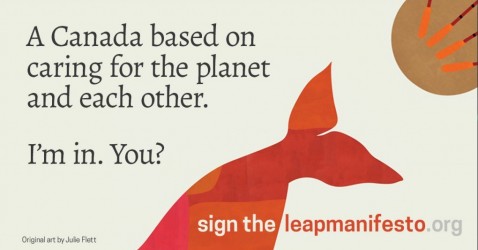Article Origin
Volume
Issue
Year
April 12, 2016.
A former Chief, who also ran for the NDP in the 2015 federal election, is coming out against the Leap Manifesto.
On the weekend, at a New Democratic Party convention held in Edmonton, membership voted to have the controversial Leap Manifesto discussed by all riding associations.
“I don’t totally support the Leap Manifesto,” said Cameron Alexis, former Alberta Regional Chief for the Assembly of First Nations. “As a former chief, I’ve always said many time over, we have to have a balanced approach when it comes down to the environment, the industry, because at the end of the day, people still have to work.”
The Leap Manifesto, in part, states, “There is no longer an excuse for building new infrastructure projects that lock us into increased extraction decades into the future. The new iron law of energy development must be: if you wouldn’t want it in your backyard, then it doesn’t belong in anyone’s backyard. That applies equally to oil and gas pipelines; fracking in New Brunswick, Quebec and British Columbia; increased tanker traffic off our coasts; and to Canadian-owned mining projects the world over.”
Alberta Premier Rachel Notley came out swinging against the sections of the document that pertained to energy infrastructure both at the convention and Monday at a press conference. She called those specific ideas “naive, they are ill-informed, and they are tone-deaf." She stressed, however, that the document had not been adopted by the federal NDP but was only going to be discussed.
Wildrose leader Brian Jean called the action taken by the NDP as a “radical anti-Alberta resolution” while Liberal leader David Swann said the LEAP Manifesto “provides a clear danger for Albertans.”
“I would support most of (Notley’s) comments. I believe she has the responsibility to not only push the NDP’s platform but also the people of Alberta,” said Alexis. “And yes, Alberta’s suffering, but at the same time, the Conservative government, after 43 years, should have had something ready to replace these low tides.”
The writing of the document was initiated in the spring of 2015 at a two-day meeting in Toronto attended by 60 representatives from Canada’s Indigenous rights, social and food justice, environmental, faith-based and labour movements.
Alexis points to the six nuclear power plants in Ontario that the document does not refer to. Although it’s clean energy, what about the nuclear waste, he says.
“Of course (Indigenous peoples) support the global approach to many facets of looking after Mother Earth, but at the same time, it’s a situation where you shouldn’t mix things without absolute clarity,” he said.
Alexis also noted that he would like to see an actual plan for transitioning away from fossil fuels.
“If we are going to do a transition, somebody should show us very definitively, in absolute terms, what is going to replace fossil fuels. It won’t take overnight to transition,” he said.
The Leap Manifesto calls for the full implementation of United Nations Declaration on the Rights of Indigenous Peoples and states, “Indigenous Peoples should be first to receive public support for their own clean energy projects.”
While those are points Alexis supports, he cautioned people “should be careful about the red herrings. Read it very carefully before you make a decision is what I would urge my fellow Indigenous people to do.”
He also says that if the Leap Manifesto is to be accepted in its fullest, those people should probably reconsider their political affiliation.
“Those supporting the Leap Manifesto perhaps really need to look in the mirror, I guess, look at maybe they’re in the wrong party. Maybe they need to go to the Green party,” he said.
Notley says the provincial NDP is not considering breaking from the federal NDP.
“It’s not uncommon for provincial parties to disagree with their federal parties in all parties. It’s also not uncommon for NDP governments to disagree with the federal NDP. We disagree on this issue,” she said.
- 2502 views

